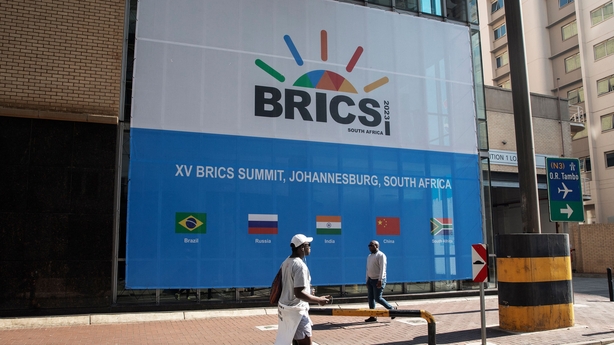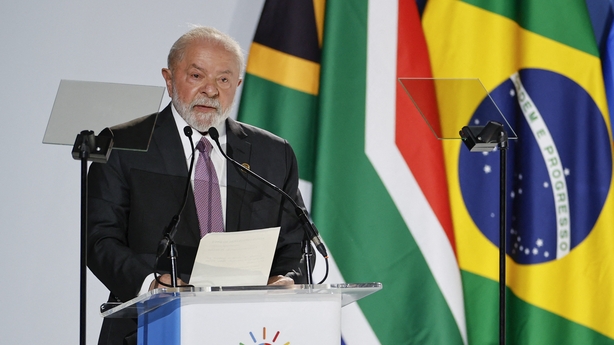BRICS leaders were weighing rules for admitting new members to the bloc of developing countries at a summit today even as splits over its future direction risked undermining its ambition to give the "Global South" more clout in world affairs.
Bloc heavyweights China and Russia - whose President Vladimir Putin is attending the meeting virtually - want to reinforce BRICS amid heightened tensions resulting from the Ukraine war and Beijing's growing rivalry with Washington.
They are seeking to use the August 22-24 summit in South Africa's commercial capital Johannesburg to forge the grouping, which also includes Brazil and India, into a counterweight to the West.
But longstanding divisions re-emerged on the first day of talks yesterday, notably voiced by Brazil's President Luiz Inacio Lula da Silva.
He said the grouping should not seek to rival the US and Group of Seven wealthy economies.
Lula and counterparts Cyril Ramaphosa of South Africa, Chinese President Xi Jinping, and Indian Prime Minister Narendra Modi met for dinner and a mini-retreat yesterday evening.
The question of enlarging BRICS has topped the agenda at the summit and exposed the kinds of divergence of vision that have long plagued the grouping.
China and Russia are keen to expand BRICS to give the bloc more global clout. South Africa's Ramaphosa said yesterday that his country's stance was similar to China's.
Brazil, meanwhile, is concerned that expanding BRICS will dilute its influence, though it wants to see neighbour Argentina join the bloc.
An Indian official familiar with the discussions yesterday between the leaders said Modi indicated his country was open to expansion but "there have to be ground rules about how it should happen and who can join".
More than 40 countries have expressed interest in joining BRICS, say South African officials. Of them, nearly two dozen have formally asked to be admitted.
While no new members are expected to be admitted to BRICS during the summit, leaders are weighing a framework and criteria for joining, details of which could be included in a joint declaration due to be finalised today.

BRICS remains a disparate group, ranging from South Africa, a relative minnow which is nonetheless Africa's most developed country, to China, the world's second biggest economy.
Russia's Putin, who is wanted under an international arrest warrant for alleged war crimes in Ukraine, is keen to show the West he still has friends.
But India, wary of Chinese dominance, has increasingly reached out to the West, as has Brazil under Lula.
Brazil's Lula says BRICS working to end Ukraine war
Brazilian President Luiz Inacio Lulada Silva said today that BRICS countries were engaged with Ukraine and Russia in efforts to end the war and he criticised the United Nations Security Council's limitations in dealing with the conflict.
Speaking at the BRICS summit in Johannesburg, Lula said an increasing number of countries, among them BRICS members, were engaged in direct contact with Moscow and Kiev.
"We stand ready to join an effort that can effectively contribute to a prompt ceasefire and a just and lasting peace," he said.

"The war in Ukraine highlights the limitations of the UN Security Council," he added at the summit's opening plenary.
With Russia's President Vladimir Putin attending remotely, Lula reiterated his country's position of "defending sovereignty, territorial integrity" and the principles of the United Nations, which has condemned Russia's invasion of Ukraine.
"The BRICS must act as a force for understanding and cooperation. Our willingness is expressed in the contributions of China, South Africa and my own country to the efforts to resolve the conflict in Ukraine," Lula said.
Putin, who faces an international arrest warrant overalleged war crimes in Ukraine, did not travel to Johannesburg to join the leaders from Brazil, India, China and South Africa.
Lula advocated a common currency to be used by BRICS countries in commercial transactions to reduce their economicvulnerabilities.
"The creation of a currency for trade and investment transactions between BRICS members increases our payment options and reduces our vulnerabilities," he told the summit plenary.

